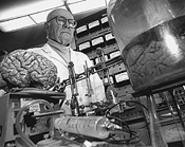There was a dog with two brains. In the 1960s, White and his surgical team attached an isolated brain to the blood vessels on a dog's neck, to see if they could get the second brain up and running while its normal brain was still intact. They could, proving that the brain was an "immunologically sound" organ -- that, unlike a kidney, it could be transplanted without likelihood of the body rejecting it.
But the dog brain was really just a warm-up act for the monkey head. In the 1970s, after a series of extensive experiments, White performed the first successful brain transplant on a primate, surgically attaching one monkey's head to another monkey's body. When the newly attached monkey woke up, he tried to bite off the finger of an attending doctor, and everyone cheered.
The next milestone would have been human head transplant surgery, performed on people whose brains were fine, but bodies weren't working. But 20 years later, that hasn't happened, and White's work has been of more interest to tabloid TV crews looking for Quasimodo in the basement rather than top neurosurgeons looking for a cure for quadriplegia.
When they hear about the surgery, "a lot of people say, "Well, I mean, you're gonna have a man's body and a man's brain," White says. " "So who is it?'"
Why, it's the guy with the brain, says White. "I believe the brain tissue is the physical repository for the human soul. I don't think the soul is in your arm, in your heart, or in your kidneys."
White's real hope is that, one day, he'll be able to supervise the first human head transplant surgery, but until then, he's not about to discourage curiosity, be it from Scientific American or Hard Copy. Though he retired from clinical surgery a few years ago (he's 74), he still puts on his lab coat frequently for interviews with reporters from all over the world, conducted in a made-for-B-movie "laboratory" in the basement of MetroHealth Medical Center. The dusty relic of the gleaming ward where he performed the surgery is crowded with skull drills, electrodes, and the requisite brain in formaldehyde.
Although he admits that questions like "Are there monkey heads in your refrigerator?" (answer: no) make him cringe, he talks candidly about the surgery, even confiding with the cameras rolling that he likes the Frankenstein movie, especially the part where Fritz goes to the laboratory to get the brain and picks the wrong jar. On The Big Chuck and Lil' John Show, he's played a doctor who gets to give an injection to a beautiful woman named Erma Body, and last Halloween, he showed up on a local kids' program with Dr. Frankenstein's doctor bag.
"It's difficult for me to read some of the garbage that's been written," he says. "But I see it as part of the game. You can't pick or choose. If you make yourself available, then you've taken for granted that what was written may not conform to personal belief."
Right now, science is 25 to 50 years away from a successful human head transplant, White estimates. Other scientists say it could happen within a year, in a country anxious to be first, like Russia or China.
"It sounds Frankensteinian, it sounds too far out," says White, whose own research was stalled as the public began to frown on animal experimentation and big-budget studies that, at least on the surface, help only a few people. "But we've got to prepare people for the 21st century. It'll be the Century of the Brain."
White, too, had to prepare himself. He says that, when he was immersed in his research, he struggled with the big questions.
"I think that very night I realized we were successful, I thought, "What have I done? Have I reached a point where the human soul can be transplanted? And if so, what does that mean?'"
The father of 10, White is an old-style Catholic: He tries to go to church, at Our Lady of Peace in Shaker Heights, every day.
"Oh, but sometimes I can't, forgive me, God," he says, quickly crossing himself and gazing mock-heavenward to the ceiling in the hospital snack bar, where he greets practically everybody.
"Hi, how you doing?" he says. "Like that purple jacket. Hi, ladies, you are looking terrific! Whattaya drinking these days?" To young friends, he even hands out fatherly admonishments: "What do you mean you were raised Catholic? You better be one, or you're gonna get spanked."
Raised by his mother and an aunt in Duluth, Minnesota, White was one of four boys. His father died fighting in World War II, and the family had no money for college -- scholarships paid his entire way through medical school.
True to his middle-American roots, he says he's always tried hard to "connect with people. I drive my wife crazy when we're traveling in airplanes. I like to know who I'm traveling with. I often pass myself off as a writer or funeral director," so people aren't afraid to talk.
But brain surgeons with Harvard degrees are privileged. They can gracefully say things like "You've got to believe, hopefully correctly, that you can help people. If you can, then it's a wonderful feeling to be able to take someone's life in your hands." So acting like a friendly neighborhood mortician can be tough.
"Dr. White calls himself Humble Bob, but people who know him know he is not humble at all," says George Stamatis, the public affairs director at Case Western Reserve University medical school, where White has been a neurological surgery professor for 40 years. "Anyone who knows him will tell you that Dr. White's favorite topic is Dr. White."
As an adviser to Pope John Paul II's Committee on Bioethics, White has strolled through the Vatican gardens with the pontiff about 15 or 20 times over the years. They talk about medical breakthroughs, like fetal tissue transplantation and brain death, as well as the pope's personal health matters. So far, the pope hasn't asked about the head transplants, and White hasn't broached the subject -- the pope is the one who broaches subjects.
But if it does come up, White says he would say that the moral issue is not whether it's right to transplant a body like you would any other donated organ, but "should the surgery be denied to people who need it?"
Outside the lab, a major part of White's career has been spent in the head trauma unit at MetroHealth, where for years he deftly performed delicate operations, but had a tough time accepting his patients' dismal prognoses.
"I became very unhappy, almost depressed with the young people," he says. "As I looked at the brain coming out of the skull, I realized, "Sure, I can fix it, I can put it back in, but they're never going to college again. Their lives are finished.'"
But when it came to talking with the patients and their families, he preferred to err on the side of false hope. "We don't know what the outcome will be," he told the parents of a girl who broke her neck in a car accident. "It's too soon."
It wasn't the right time to break the real news. "I knew, as the days turned into weeks and the girl didn't move, she and her parents would come to understand. Why pull the rug out from underneath them and their hopes within hours of the injury? Why be able to go around and say, "Well, I told you so'?"
For the past five or six years, White has regularly done interviews on head transplant surgery with a partner -- Craig Vetovitz, a biker and polymer engineer who broke his neck 25 years ago in a diving accident, when he was 19.
"They were looking for somebody loud and boisterous, who didn't give a shit about other people's opinions," Vetovitz says. "I was all for it."
Vetovitz is technically not a quadriplegic, because he has some movement in his hands, and he can even stand up, with help. "My feet are very ticklish," he says. But like most quads, he expects his internal organs to start failing in middle age, his life cut short. So if head transplants become available, he'll be the first in line.
"Everybody always thinks, "Oh, what a gross, horrible, mean thing to do to a person," he says of the surgery. "Well, pretend you're a total quad. Let's say you're real thirsty -- ask somebody to get you a glass of water, or ask somebody to help you transfer to the toilet when you have to go. When you become disabled, you lose all privacy. Your life is a schedule."
The tabloid approach rarely fazes Vetovitz. But one time, Hard Copy packaged his story in the Halloween episode, likening White and him to "Dr. Frankenstein and his monster."
"That really burned me up," Vetovitz says. He called up the producers, chewed them out, and they ran a second, less tasteless piece.
Vetovitz calls White, who has advised him on medical matters, "a very noble character."
"He's not the type of person that's just gonna switch a head, unless there's a very high chance of full recovery. He knows what it's like being behind the eyes -- because he sees it all the time, he sees the misery."
Any risks involved don't matter, says Vetovitz. When your life is changed forever because you landed in the pool the wrong way, risks are all relative.
White's first medical breakthrough was not head transplantation, but a technique of cooling the spinal cord that slowed down the damage enough so that doctors could operate on it. Then came his advances in extracorporeal perfusion, the isolation and cooling of the brain -- a technique now used in the Mayo Clinic and most other top hospitals. Sometimes he wonders why all the reporters don't ask him about those achievements, since they've actually been put in practice.
"We discovered that you can keep a human brain going without any circulation," he says. "It's dead for all practical purpose -- for over an hour -- then bring it back to life. If you want something that's a little bit science fiction, that is it, man, that is it!
"Here I spent all my years in brain surgery: training people, inventing new procedures, and taking care of patients. And it's just the worst thing I did for myself -- I came up with this head transplant idea. If I got rid of that, I'd be happy." Roll the cameras.
Laura Putre can be reached at [email protected].














